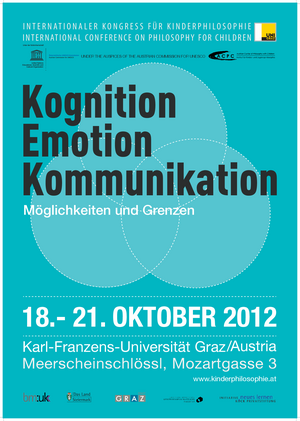International Conference of Philosophy for Children 2012
"Cognition - Emotion - Communication: Possibilities and Limits"
from 18 - 21 October 2012 in Graz/Austria
This year's congress faces up to special challenges.
It is about exploring the possibilities and limits, establishing the differences but also the connections and in particular the interdependencies between cognition - emotion - communication.
A look at various scientific disciplines shows that in many areas, from philosophy to psychology, sociology, linguistics, neuroscience and education, there is a great deal of effort being made to deal intensively with the complexity and dynamics of cognition - emotion - communication.
The key question is: What role does the promotion of the "socio-organic whole" of cognition - emotion - communication play in the free development of the child?

This is a challenge for philosophy.
How can it promote the cognitive and emotional development of children, as well as their language skills and curiosity, and encourage them to ask questions and think in alternatives?
Critical, reflective thinking and creative problem-solving are crucial for people's abilities and skills - in speaking and acting - in the application of knowledge in everyday life, in art, science, technology and society, in all processes.
It is essential to start promoting these key competences in children - children of primary school age have developed a network of hypotheses and ideas to explain the world to themselves.
Philosophising as an elementary cultural technique is the basis of all critical, networked thinking - the development of a "community of inquiry" plays an increasingly central role in dealing with the current problems of our time (against the backdrop of global connections and cultural diversity).
An important goal of this congress is to identify the diversity, complexity and dynamics in the rapidly changing world of today. This can help to position children's ways of life and ideas.
In recent decades, children's philosophy has laid important foundations for starting the philosophical-pedagogical process in early childhood - with the aim of enabling children to develop their own personality, problem-solving skills, self-criticism, the ability to deal with conflict and empathy, as well as supporting the development of differentiated perception.
Philosophising with children and young people imparts skills and competencies that are essential for regaining the future viability of society in terms of sustainable development.
The congress focusses on questions that lie at the interface between philosophical thinking, scientific research and current social problems.
The essential aim of the congress is to contribute findings, clarify the fundamentals of cognitive and emotional processes, contribute to a deeper understanding and develop innovative approaches that are both scientifically sound and can be put into practice in a communicative and social way.
The topics of the congress will include the following areas:
- Meaning and interaction of cognition and emotion
- Interdependencies between cognition, emotion and communication
- Community of Inquiry (research community)
- Lifelong learning
- Critical, creative and caring thinking
- Emotions as judgements of reason
- Intercultural communication and global thinking
- Philosophy and brain research: neurophilosophy as a new orientation
- Learning processes and value education